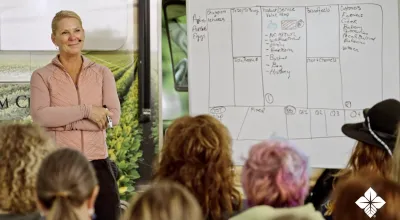
6 Steps For Finding Your Niche As A Beginning Farmer
As an aspiring or beginning farmer, it’s key to find your niche – whether that involves raising chickens, growing organic fruits and vegetables, or making artisanal cheese. Roxanne Reed, founder and CEO of Farm School on Wheels, shares six tips for determining what market segment is right for you as you start your own farming venture. Get ready to dig in and start growing!
1. Consider your interests and skills.
To help you find your niche, start thinking about what you’re passionate about and good at. Maybe you love nurturing plants or working with animals. Or perhaps you have a knack for business, marketing or educating others. Pinpoint your key interests and strengths – they'll help guide you to your niche.
2. Research the market.
One common mistake some farmers make is assuming there will always be a market for their produce or livestock or planting the same crops or raising the same livestock as the farms around them because they think that’s what’s going to sell. The problem with this approach is that the market eventually becomes saturated with one type of product, forcing producers to compete by lowering their prices. To avoid oversaturation, see what’s already out there in your area and where there are opportunities. Check websites like LocalHarvest.org to view available products from nearby farms to see what’s missing or underserved. This kind of research can reveal niche opportunities, such as organic berries, microgreens, eggs or Christmas trees. If you want to succeed in farming, you’ll need to offer products that you can sell for the price you need to be profitable.
3. Learn the fundamentals.
Learn the basics of how to grow crops or raise the livestock you want to produce. Study soil science, plant propagation and pest management. Determine what livestock would be the best fit for your operation – poultry, cattle, pigs, sheep, etc. Learn how to operate essential farm equipment safely and efficiently. Take a course on sustainable and organic farming methods. The more you know, the better prepared you'll be.
4. Get hands-on experience.
Reading about farming is helpful, but nothing is as valuable as real-world experience. Connect with local producers to see if you can shadow a more experienced farmer or try volunteering at a local operation to learn the day-to-day responsibilities.
5. Start small and specialize.
When you’re starting out, it can be tempting to dive in headfirst and try to do everything at once. But successful farmers understand that starting small and testing their ideas is key. Focus on one or two products you can do well, such as a small herd of goats for artisanal cheese or a few acres of heirloom tomatoes. Build your skills and customer base, and then consider expanding into related areas. Starting small allows you to learn from your experiences and make incremental changes over time based on what works best for you and your farm – all while controlling quality and managing risk.
6. Cultivate a support system.
Surround yourself with people who will be truthful, even when you may not want to hear it. Find fellow farmers and business professionals outside of farming who will give you honest advice from a fresh perspective.
The journey to becoming a successful farmer begins with passion and can result in profitability. If you love what you’re doing, think strategically and offer a high-quality product, your niche operation should do well. Take the time to learn the ins and outs of the type of operation you want to start to ensure you’re well-positioned for success.

























